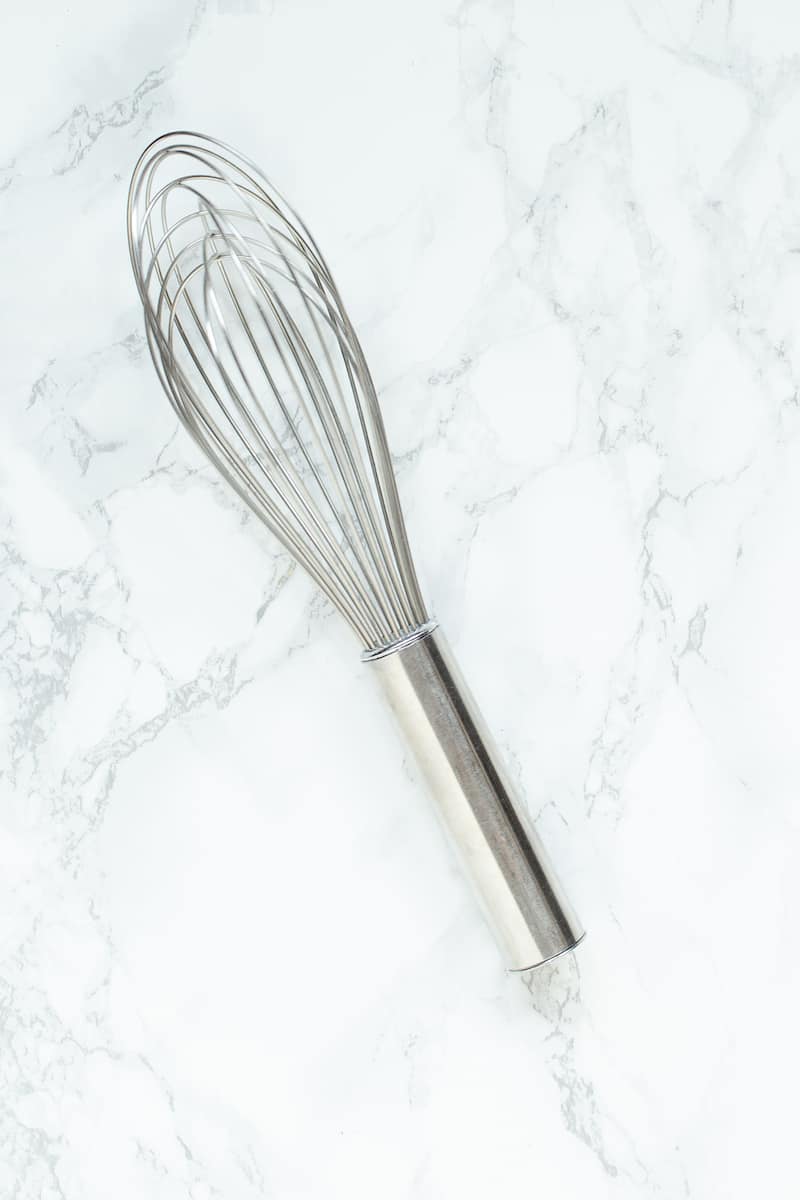Which Whisk is Which? Different Types of Whisks and The Best Whisk for Every Recipe
I always say there’s no such thing as too many spatulas, but does the same go for whisks?
There are so many different types of whisks on the market that you could have an entire utensil drawer dedicated to whisks alone.
While you definitely don’t need every single type of whisk in your own kitchen, you might discover that there’s a particular kind that fits your cooking style.
Stainless steel, silicone-coated, copper, or chrome–there’s a whisk for every kind of pan and every aesthetic.

Watch the video or read on to learn about the different types of whisks and what they’re most commonly used for.
Balloon Whisk
This whisk with rounded wires that expand into a bulbous–or, you know, a balloon shape–is likely the “everyday” whisk in most kitchen arsenals.

The shape of a balloon whisk makes it the go-to choice for whisking and blending ingredients in standard mixing bowls. Look for stiff wires, which can cut through thicker ingredients like pancake batter with ease.
French Whisk
Similar to a balloon whisk but with a more tapered shape, the French whisk is pretty much also what it sounds like: a slightly fancified version of the basic whisk.
Its thinner profile and more closely-spaced wires make it better suited for sauces and liquids like salad dressing than denser batters.

Balloon whisks and French whisks are the basic types of whisks you’ll find in generic kitchen departments of big-box stores and grocery stores. They’ll get the job done when it comes to combining pretty much any batter or liquid.
But if you’re looking for what I personally think are the best batter beaters, here are the types of whisks I really love…
Ball Whisk
OK, here’s a bold statement: the ball whisk, which just so happens to resemble a midcentury Nelson ball clock, also happens to be my favorite whisk for all-purpose use.

Instead of a wire cage, the metal balls on the end of each prong work to break up ingredients like eggs and blend them into a homogenous liquid.
Bonus: a ball whisk is much easier to clean than a regular balloon whisk.
Because each prong is separate, instead of connected into a tangled-ish loop, you won’t have to dig into the wires to make sure every speck of egg or batter has been expunged.
Flat Whisk
My second-favorite whisk in the kitchen, the flat whisk is also known as a roux whisk. Its “smashed” profile means it can slide its way around the edges of a saucepan with unparalleled ease.

If you’re combining dry ingredients like flour into a sauce, as in a roux or gravy, you’ll love this whisk for the way it picks up every floury speck and incorporates it into the dish.
It’s also gentle enough to use when stirring together or lemon curd.
Coil Whisk
The coil whisk, also sometimes called a spring whisk or a galaxy whisk, isn’t seen as often in modern kitchens. And that’s a shame! It’s a fun little piece of kitchen equipment, and definitely has its uses.

Like a flat whisk/roux whisk, it excels at breaking up pockets of lumpy dry ingredients when making gravy.
But where it really shines is when blending ingredients in a cup, like when you’re making chocolate milk or beating an egg for a microwave meal.
Because you can pump the coil whisk up and down instead of whisking it in a circular motion, you can use it in skinny, vertical glassware and Mason jars with ease. Definitely something to add to your camping gear!
Dough Whisk
The most specialized whisk out of all those listed here, the dough whisk is made of one thick, looping piece of wire that looks like it was designed by Alexander Calder.
As you might expect, it has one purpose: to blend thick, shaggy bread and pastry doughs.

If you’re a hardcore baker, you probably already know about and own a dough whisk.
But if you’re trying to bake more bread, invest in one of these and make your life easier. Even no-knead bread benefits from this whisk.
So now you know which whisk is which and when to use these types of whisks in your everyday cooking and baking. What are you waiting for? Whisk away!
FTC Disclosure: As an Amazon Associate, I earn from qualifying purchases. Good Food Stories LLC receives a minuscule commission on all purchases made through Amazon links in our posts.
Casey Barber
Casey Barber is the owner and founder of Good Food Stories LLC and a visual storyteller whose work often focuses on the intersection of food and culture. She is also the author of the cookbooks Pierogi Love: New Takes on an Old-World Comfort Food and Classic Snacks Made from Scratch: 70 Homemade Versions of Your Favorite Brand-Name Treats, and she couldn’t get anything done without the help of her executive assistant cats, Bixby and Lenny. Her favorite color is obviously orange.